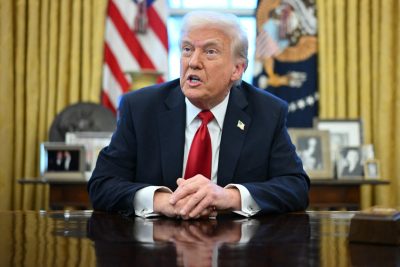Trump’s plan to crush BRICS alliance

The United States President, Donald Trump, has taken a confrontational stance towards the BRICS economic alliance. BRICS is acronym for Brazil, Russia, India, China, and South Africa, and BRICS+ is a 10 member grouping that includes Egypt, Ethiopia, Iran, the United Arab Emirates (UAE), and Indonesia in addition to the five original members.
Trump on multiple occasions has threatened to impose 100 or 150 per cent tariffs on BRICS+ nations as they seek to challenge the dominance of the U.S. dollar in global trade and finance. “If they want to play games with the dollar; if any trading gets through it’ll be 100 per cent tariff, at least,’’ he said in response to a question about the BRICS nations setting up their own currency. Trump first made such tariff threats in December 2024 and then few more times in January 2025 after his inauguration ceremony.
In a statement on his Truth Social page, Trump said: ‘’We are going to require a commitment from these seemingly hostile countries that they will neither create a new BRICS currency, nor back any other currency to replace the mighty U.S. dollar or, they will face 100 per cent tariffs. There is no chance that BRICS will replace the U.S. dollar in international trade, or anywhere else, and any country that tries should say hello to tariffs, and goodbye to America,’’ he said.
It’s clear that Trump’s approach to countering BRICS revolves around aggressive economic policies, including punitive tariffs and sanctions on member nations, and rhetoric aimed at undermining the bloc’s efforts to de- dollarise and expand its influence.
Nigeria, Africa’s largest economy and most populous country, has shown significant interest in cooperation with the BRICS nations. Although Nigeria is not yet a full member of the bloc, it has recently been included as a partner country along with 12 other countries, indicating its growing ties with the group. The country expects that its partnership with the BRICS countries will open up opportunities for foreign direct investment (FDI) and economic cooperation.
In 2024, Nigeria reportedly attracted $1.27 billion in foreign capital, and its inclusion among BRICS partners is seen as a way to further strengthen these economic ties and use the relationships to develop its infrastructure, energy, and industry. As a country rich in natural resources, Nigeria could be seeking to diversify its trade partnerships beyond its traditional Western allies. BRICS provides an opportunity to interact with developing economies, especially in areas such as oil and gas, agriculture and technology.
The country’s Foreign Minister, Yusuf Tuggar, has even stressed the importance of using Nigeria’s large economy and population to strengthen trade ties with the BRICS countries. The government reportedly views BRICS as a platform for strengthening its influence on the world stage. Being one of the “big three” economies in Africa along with Egypt and South Africa, Nigeria’s potential full membership in the BRICS may strengthen its geopolitical influence. The bloc’s focus on creating a multipolar world is consistent with Nigeria’s foreign policy goals aimed at reducing dependence on Western powers.
BRICS is currently managing its own New Development Bank (NDB), which provides financing for infrastructure and sustainable development projects to its member and partner countries. Nigeria is expected to use such financing to address its infrastructure shortages and support its economic development goals. Even as Nigeria is at present a partner member, the government has expressed a clear intention to become a full member of the BRICS over the next two years.
This would allow the country to participate more actively in shaping the bloc’s policies and initiatives. Surely the country would be able to use its economic opportunities and population to secure a place at the negotiating table. However observers are raising the alarm that Nigeria’s strong ties with Western powers and internal economic and political problems could mar its ambition to fully integrate with the BRICS.
Nations of BRICS have chosen to ignore Trump’s threats and go ahead with exactly what they intend on doing –finding an alternative to U.S. dollar for global trade. There are currently discussing the creation of a new currency to facilitate trade and reduce dependence on the dollar, particularly in response to U.S. sanctions on Russia and other countries. Without mincing his words, Brazil’s president, Lula da Silva, in a direct response to Trump’s repeated threats, said the ‘’BRICS is committed to ending U.S. dollar dominance no matter what.’’
Trump’s administration has historically used sanctions as a tool to counter perceived threats to U.S. dominance, and this approach is expected to continue. Sanctions on Russia, a key BRICS member, have already pushed the bloc to explore alternatives to the dollar. His current aggressive stance on sanctions is inadvertently fueling BRICS de-dollarisation efforts.
By targeting BRICS nations with economic pressure, Trump aims to weaken their ability to cooperate and challenge U.S. hegemony in Western financial systems. His threats of tariffs and economic penalties are also aimed at discouraging aspiring BRICS members from aligning with the bloc.
Consequently the BRICS nations are now strengthening their cooperation and pushing harder for de-dollarisation. The outcome of this confrontation will have a significant implications for the global financial system.
•John Dansofo wrote from Zaria.

